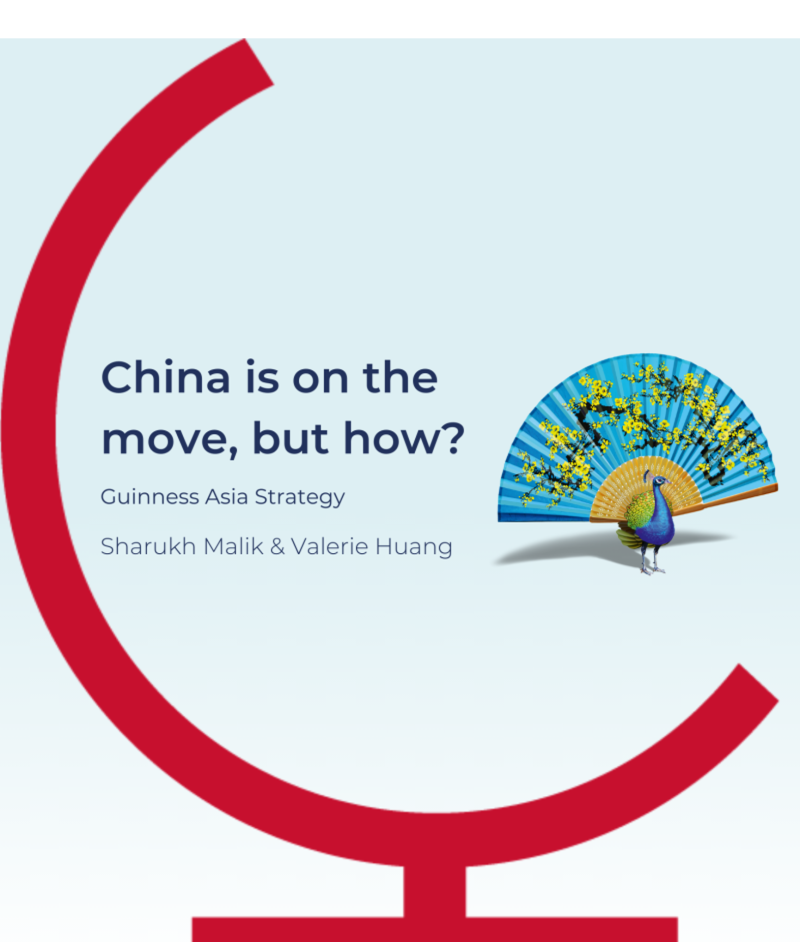China is on the move, but how?
Growth Funds
15/10/2024
Portfolio manager Sharukh Malik looks at recent policy updates, how the PBOC are driving change, consumer benefits and where China might be moving in the future.
Sharukh Malik
Portfolio Manager, Asian & Emerging Markets
Valerie Huang
Investment Analyst, Asian & Emerging Markets

Valerie Huang
So we're here to talk about China. Why don’t you start us off with what's happened over the last few weeks?
Sharukh Malik
So yeah, what we've seen is some political changes and some actions from the Central Bank, which was unexpected by the market. If I have to sum it up, the Politburo, which represents the top leadership by China, they have very suddenly changed some of their wording with how they approach the economy and this has caught investors by surprise, in a positive way. And during the same week, we saw the Central bank, the PBOC, cut monetary policy a lot more aggressively than the market was expecting. And then there's also been more support for the consumer, for businesses, and for equity markets.
Valerie Huang
OK. I mean, you've mentioned the change in political tone. Could you give an example or just sort of expand on that a little bit?
Sharukh Malik
So I think it's interesting always to compare the statements that the Politburo comes out with. So I think it's quite useful to compare the April statement and the September statement. So in the April set of statements, the Politburo was quite vague with some of the policies they were interested in. So when they talked about monetary policy and supporting the economy, they used the word prudent monetary policy. I think that's very subjective. Whereas in September they've actually come out and say they need to decisively cut interest rates, they have explicitly said they need to cut the required reserve ratio. So releasing liquidity into the economy. So the fact that they are now putting down on paper actual specific policy moves rather than just giving broad based aims I think is really important. And I think in China sort of reading the tea leaves when it comes to government policy statements is really important, and that is something a lot of Western investors don't understand.
Valerie Huang
Fine, and how do we feel about, I mean obviously you think the general momentum is in the right direction, but do you think this is enough or do you think they need to be a lot more clear on the next steps?
Sharukh Malik
I think the policy moves they have started with are definitely in the right direction, but generally speaking the scale needs to be increased significantly. So if I clasp the policy actions into three measures, we've got monetary support, we've got property market support and then fiscal policy or consumer support. So with the monetary policy actions, I think it makes sense. It's textbook economics that when you want to boost the economy and you cut interest rates, you lower the required reserve ratios and these measures do make sense. But at the end of the day, cutting interest rates by 20 basis points, increasing liquidity by cutting the required reserve ratios. They're not really solving the main problem and what is the main problem in China? It's the lack of demand for credit rather than the supply of credit. So while these monetary actions are necessary, they're not essential or enough, I would say. We then move on to the property market where I think OK, cutting the mortgage rate by 50 basis points. That definitely helps, but actually it's the support for the consumer through fiscal policy, which is going to help China address the transition its economy is undergoing.
Valerie Huang
You've mentioned the change in property tone. Do you think that's a step away from their overarching plan or do you think it's just a pause in their shift away, from moving away from property?
Sharukh Malik
Well, I think here it's really interesting again to look at the Politburo statements in the September statement, they are now actively saying they want to stabilise the market and stop property prices from falling. So them actually coming out and saying that now we see what their objective is. Importantly, they haven't said they want the property market to grow because the problem from policymakers point of view is they don't want to start another boom cycle where we've got another Evergrande or country garden or speculative investments in these random tier 3, 4 cities. They want to stabilise the market, but the overarching plan for China is still to move up the value chain. China's current GDP per capita is $12,000 per person. What takes that to $30,000? It's not property investment. It is generally moving up the value chain. So industrial automation, developing pharmaceutical products, themselves, the whole electric vehicle supply chain that is still the plan, but I think to help the economy and the transition towards these higher value added industries, stabilising the property market does help.
Valerie Huang
You mentioned the PBOC earlier. Could you go into a bit more detail about the changes that they talked about?
Sharukh Malik
The PBOC, which is China's central bank, they have cut interest rates by more than the market was expecting. So normally they cut interest rates by 10 basis points. This time they cut short term rates by 20 basis points. So the magnitude of the cut, greater than usual, and I think the market was caught by surprise by that. One of the other measures they did was to try their best to make sure the excess savings are directed towards spending. Because if you just cut interest rates and then consumers go and put their excess money into their savings account, that doesn't actually help the broader economy. So they cut deposit rates by a similar amount, that definitely helps. And then also the PBOC cuts required reserve ratios by 50 basis points and that essentially injects a lot of liquidity into the broader economy. Now, we think these measures are helpful for the economy, but they don't do very much to address the underlying problem, which is the lack of demand for credit.
Valerie Huang
And so what do you think this means for the property market?
Sharukh Malik
I think the intention is to help the consumer have extra income and potentially increase the demand for property, but then when you look into each individual measure, I think the impact is fairly limited. So they've cut the mortgage rate for existing mortgages by 50 basis points. So the PBOC says this should save about CN¥150 billion, but when you compare or convert that into dollars and then look at how much each household theoretically saves, it's about $30 to $43 month. So it's not really going to change much in the grand scheme of things, although the intention is positive. The other changes we've seen is cutting the down payment ratio for second homes down to 15%. So that essentially puts it at the same level as for first homes and also removing home purchase restrictions in some of the tier one cities. So in your Beijing, your Shanghai's, Guangzhou's reducing the restrictions which in theory should increase the demand for property.
Valerie Huang
So why now for all of the changing tone and the extra support?
Sharukh Malik
So if you think about the average consumer in China and what they've had to endure for the past few years, it's pretty safe to say it's been tough. So we had COVID and then of course, China had their very strict COVID lockdowns. We then moved on past the lockdowns and everyone thought the economy would bounce back pretty sharply while there has been a bounce back. It's not been as strong as everyone thought and the reason for that is because the government wants to redirect the economy away from property infrastructure and toward the new pillar industries. Now, of course, doing the maths, this does involve some economic pain for the consumer. You've seen household wealth fall as property prices have declined and people generally are feeling gloomy, even though from an economist point of view, I completely understand what the government is trying to do. And I think if you think about the pain threshold that has generally been reached and the government feels now it has to do something to manage the transition for the next year or two.
Valerie Huang
Fine. Well then what do you think are the next steps that we need to watch out? For all of this to work or, to push the government to make more steps for it to work?
Sharukh Malik
So I think the scale of the support in fiscal policy, so supporting the consumer, that is really what we need to watch out for the steps they've put in so far, they definitely make sense, but they need to be increased in size quite significantly. So the first question is how could they fund this extra spending? And that's question number 1 technically the government has to wait for the National People's Congress. To meet and improve extra bond issuances and this happens later in October. So that is step number one. Once that happens then the government can announce what they will spend the proceeds on, I think expanding the scope of the consumer trading programme definitely makes sense. I think increasing the funds for capital upgrades for businesses is also a good idea. And we've also seen consumption vouchers being issued in some of the cities such as Shanghai, Chengdu. They make sense, but right now they're tiny in the grand scheme of things, so greater funding for these consumption vouchers can also help the consumer.
Valerie Huang
Can you tell us a little bit more about the consumer trading programme, what it is now and how you think it needs to be expanded?
Sharukh Malik
Yeah, sure. So in China, the government has allocated CN¥150 billion, that allows consumers to trade in their older household appliances to say a TV, a fridge, and then they get a subsidy to buy a brand new one. So they this is something they've used in the past. So when the great financial crisis happened, the government also used a similar scheme, which looking back worked really effectively, so I think now using a similar policy also makes sense.
Valerie Huang
Tying all of it together, what do you think are the market implications for all of this?
Sharukh Malik
So I think it's a really interesting time for China. It's obviously not being in favour with global investors for a very long time and there is a reason for that. But I would say now the policy regime in China is changing and many global asset allocators now need to decide what to do on the asset class. I think even with the spike in performance in China at the end of September and early October, that actually there's a lot of room for China to catch up with the rest of Asia, Emerging Markets. So investors shouldn't feel like they've missed the boat because there's a lot of room for catch up in that respect. And I think when you look at China's valuations, so just say the forward year price to earnings ratio and compare that to Asia Pacific ex Japan or the MSCI World Index even with the bounce in activity recently, we're still trading very cheap relative to other major markets.
Valerie Huang
What do you think Guinness can do, or what can we offer that could help our clients?
Sharukh Malik
So we have a range of funds within the Asia and emerging markets team, which can be of interest to investors. So we have the Guinness Asian Equity Income Fund and the Emerging Markets Equity Income Fund where we have a full allocation to China. We've remained bullish on China for the past few years. So we have been in a position to capture this recent rally in China and then for those looking for dedicated China exposure, we also have two offerings here. We have a Guinness Greater China Fund and the Guinness China A Share Fund. The first invest in both offshore and onshore China, the second gives dedicated A Share exposure for those with higher risk tolerances.
Valerie Huang
Can I ask what you think the impact of this will be on Greater China for example, so mainland versus the wider China region?
Sharukh Malik
So I think so far investors have really liked the offshore exposure. So when I say investors, international investors typically have gone for the Hang Seng Composite listed stocks to get their China exposure but I think really a lot of these smaller a share companies should actually be of interest. And this is where traditionally the Chinese retail investor has been very active, but for international investors, there's a lot of A Shares out there which are in very interesting areas, getting a lot of policy support and are being completely ignored by both domestic and foreign investors. The valuations of these a shares very attractive relative to their long term. History sorts of companies we like, they have strong balance sheets or a lot of cash, relatively low debt. So they've been they've been able to weather the past year or two of relative weakness in China and now if the government does come through with greater policy support, they should be in a good area to grow earnings over the next 5-10 years.
Valerie Huang
Thank you very much for spending time with us and going through a bit more of China, thanks for your time.
So we're here to talk about China. Why don’t you start us off with what's happened over the last few weeks?
Sharukh Malik
So yeah, what we've seen is some political changes and some actions from the Central Bank, which was unexpected by the market. If I have to sum it up, the Politburo, which represents the top leadership by China, they have very suddenly changed some of their wording with how they approach the economy and this has caught investors by surprise, in a positive way. And during the same week, we saw the Central bank, the PBOC, cut monetary policy a lot more aggressively than the market was expecting. And then there's also been more support for the consumer, for businesses, and for equity markets.
Valerie Huang
OK. I mean, you've mentioned the change in political tone. Could you give an example or just sort of expand on that a little bit?
Sharukh Malik
So I think it's interesting always to compare the statements that the Politburo comes out with. So I think it's quite useful to compare the April statement and the September statement. So in the April set of statements, the Politburo was quite vague with some of the policies they were interested in. So when they talked about monetary policy and supporting the economy, they used the word prudent monetary policy. I think that's very subjective. Whereas in September they've actually come out and say they need to decisively cut interest rates, they have explicitly said they need to cut the required reserve ratio. So releasing liquidity into the economy. So the fact that they are now putting down on paper actual specific policy moves rather than just giving broad based aims I think is really important. And I think in China sort of reading the tea leaves when it comes to government policy statements is really important, and that is something a lot of Western investors don't understand.
Valerie Huang
Fine, and how do we feel about, I mean obviously you think the general momentum is in the right direction, but do you think this is enough or do you think they need to be a lot more clear on the next steps?
Sharukh Malik
I think the policy moves they have started with are definitely in the right direction, but generally speaking the scale needs to be increased significantly. So if I clasp the policy actions into three measures, we've got monetary support, we've got property market support and then fiscal policy or consumer support. So with the monetary policy actions, I think it makes sense. It's textbook economics that when you want to boost the economy and you cut interest rates, you lower the required reserve ratios and these measures do make sense. But at the end of the day, cutting interest rates by 20 basis points, increasing liquidity by cutting the required reserve ratios. They're not really solving the main problem and what is the main problem in China? It's the lack of demand for credit rather than the supply of credit. So while these monetary actions are necessary, they're not essential or enough, I would say. We then move on to the property market where I think OK, cutting the mortgage rate by 50 basis points. That definitely helps, but actually it's the support for the consumer through fiscal policy, which is going to help China address the transition its economy is undergoing.
Valerie Huang
You've mentioned the change in property tone. Do you think that's a step away from their overarching plan or do you think it's just a pause in their shift away, from moving away from property?
Sharukh Malik
Well, I think here it's really interesting again to look at the Politburo statements in the September statement, they are now actively saying they want to stabilise the market and stop property prices from falling. So them actually coming out and saying that now we see what their objective is. Importantly, they haven't said they want the property market to grow because the problem from policymakers point of view is they don't want to start another boom cycle where we've got another Evergrande or country garden or speculative investments in these random tier 3, 4 cities. They want to stabilise the market, but the overarching plan for China is still to move up the value chain. China's current GDP per capita is $12,000 per person. What takes that to $30,000? It's not property investment. It is generally moving up the value chain. So industrial automation, developing pharmaceutical products, themselves, the whole electric vehicle supply chain that is still the plan, but I think to help the economy and the transition towards these higher value added industries, stabilising the property market does help.
Valerie Huang
You mentioned the PBOC earlier. Could you go into a bit more detail about the changes that they talked about?
Sharukh Malik
The PBOC, which is China's central bank, they have cut interest rates by more than the market was expecting. So normally they cut interest rates by 10 basis points. This time they cut short term rates by 20 basis points. So the magnitude of the cut, greater than usual, and I think the market was caught by surprise by that. One of the other measures they did was to try their best to make sure the excess savings are directed towards spending. Because if you just cut interest rates and then consumers go and put their excess money into their savings account, that doesn't actually help the broader economy. So they cut deposit rates by a similar amount, that definitely helps. And then also the PBOC cuts required reserve ratios by 50 basis points and that essentially injects a lot of liquidity into the broader economy. Now, we think these measures are helpful for the economy, but they don't do very much to address the underlying problem, which is the lack of demand for credit.
Valerie Huang
And so what do you think this means for the property market?
Sharukh Malik
I think the intention is to help the consumer have extra income and potentially increase the demand for property, but then when you look into each individual measure, I think the impact is fairly limited. So they've cut the mortgage rate for existing mortgages by 50 basis points. So the PBOC says this should save about CN¥150 billion, but when you compare or convert that into dollars and then look at how much each household theoretically saves, it's about $30 to $43 month. So it's not really going to change much in the grand scheme of things, although the intention is positive. The other changes we've seen is cutting the down payment ratio for second homes down to 15%. So that essentially puts it at the same level as for first homes and also removing home purchase restrictions in some of the tier one cities. So in your Beijing, your Shanghai's, Guangzhou's reducing the restrictions which in theory should increase the demand for property.
Valerie Huang
So why now for all of the changing tone and the extra support?
Sharukh Malik
So if you think about the average consumer in China and what they've had to endure for the past few years, it's pretty safe to say it's been tough. So we had COVID and then of course, China had their very strict COVID lockdowns. We then moved on past the lockdowns and everyone thought the economy would bounce back pretty sharply while there has been a bounce back. It's not been as strong as everyone thought and the reason for that is because the government wants to redirect the economy away from property infrastructure and toward the new pillar industries. Now, of course, doing the maths, this does involve some economic pain for the consumer. You've seen household wealth fall as property prices have declined and people generally are feeling gloomy, even though from an economist point of view, I completely understand what the government is trying to do. And I think if you think about the pain threshold that has generally been reached and the government feels now it has to do something to manage the transition for the next year or two.
Valerie Huang
Fine. Well then what do you think are the next steps that we need to watch out? For all of this to work or, to push the government to make more steps for it to work?
Sharukh Malik
So I think the scale of the support in fiscal policy, so supporting the consumer, that is really what we need to watch out for the steps they've put in so far, they definitely make sense, but they need to be increased in size quite significantly. So the first question is how could they fund this extra spending? And that's question number 1 technically the government has to wait for the National People's Congress. To meet and improve extra bond issuances and this happens later in October. So that is step number one. Once that happens then the government can announce what they will spend the proceeds on, I think expanding the scope of the consumer trading programme definitely makes sense. I think increasing the funds for capital upgrades for businesses is also a good idea. And we've also seen consumption vouchers being issued in some of the cities such as Shanghai, Chengdu. They make sense, but right now they're tiny in the grand scheme of things, so greater funding for these consumption vouchers can also help the consumer.
Valerie Huang
Can you tell us a little bit more about the consumer trading programme, what it is now and how you think it needs to be expanded?
Sharukh Malik
Yeah, sure. So in China, the government has allocated CN¥150 billion, that allows consumers to trade in their older household appliances to say a TV, a fridge, and then they get a subsidy to buy a brand new one. So they this is something they've used in the past. So when the great financial crisis happened, the government also used a similar scheme, which looking back worked really effectively, so I think now using a similar policy also makes sense.
Valerie Huang
Tying all of it together, what do you think are the market implications for all of this?
Sharukh Malik
So I think it's a really interesting time for China. It's obviously not being in favour with global investors for a very long time and there is a reason for that. But I would say now the policy regime in China is changing and many global asset allocators now need to decide what to do on the asset class. I think even with the spike in performance in China at the end of September and early October, that actually there's a lot of room for China to catch up with the rest of Asia, Emerging Markets. So investors shouldn't feel like they've missed the boat because there's a lot of room for catch up in that respect. And I think when you look at China's valuations, so just say the forward year price to earnings ratio and compare that to Asia Pacific ex Japan or the MSCI World Index even with the bounce in activity recently, we're still trading very cheap relative to other major markets.
Valerie Huang
What do you think Guinness can do, or what can we offer that could help our clients?
Sharukh Malik
So we have a range of funds within the Asia and emerging markets team, which can be of interest to investors. So we have the Guinness Asian Equity Income Fund and the Emerging Markets Equity Income Fund where we have a full allocation to China. We've remained bullish on China for the past few years. So we have been in a position to capture this recent rally in China and then for those looking for dedicated China exposure, we also have two offerings here. We have a Guinness Greater China Fund and the Guinness China A Share Fund. The first invest in both offshore and onshore China, the second gives dedicated A Share exposure for those with higher risk tolerances.
Valerie Huang
Can I ask what you think the impact of this will be on Greater China for example, so mainland versus the wider China region?
Sharukh Malik
So I think so far investors have really liked the offshore exposure. So when I say investors, international investors typically have gone for the Hang Seng Composite listed stocks to get their China exposure but I think really a lot of these smaller a share companies should actually be of interest. And this is where traditionally the Chinese retail investor has been very active, but for international investors, there's a lot of A Shares out there which are in very interesting areas, getting a lot of policy support and are being completely ignored by both domestic and foreign investors. The valuations of these a shares very attractive relative to their long term. History sorts of companies we like, they have strong balance sheets or a lot of cash, relatively low debt. So they've been they've been able to weather the past year or two of relative weakness in China and now if the government does come through with greater policy support, they should be in a good area to grow earnings over the next 5-10 years.
Valerie Huang
Thank you very much for spending time with us and going through a bit more of China, thanks for your time.
Discover our Asia & Emerging Markets strategies
Slide item
Image

Guinness Asian Equity Income Fund
The Guinness Asian Equity Income strategy invests in high-quality dividend-paying companies in the Asia Pacific region.
Slide item
Image

Guinness Emerging Markets Equity Income Fund
The Guinness Emerging Markets Equity Income fund aims to provide investors with capital growth and income by investing in emerging markets worldwide.
Slide item
Image

Guinness Greater China Fund
The Guinness Greater China strategy invests in quality companies with exposure to the development and growth of the Greater China region.
Slide item
Image

Guinness China A Share Fund
The Guinness China A Share strategy invests in quality, profitable companies exposed to the structural growth themes we have identified in the China A share market.

